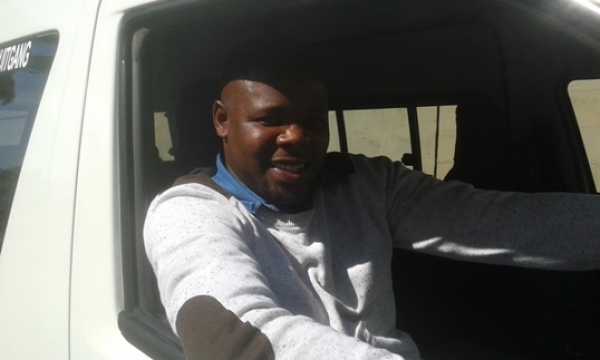Will there be an investigation into police shooting?

The man shot by police during evictions in Philippi East a month ago is back at work — and still waiting for police investigators to contact him.
Walking with a slight limp, Patrick Sobutyu, 31, returned to work on Tuesday as a taxi driver on the Nyanga-Wynberg route after nearly a month off sick. Wherever he went at the Wynberg taxi rank, he was embraced by colleagues.
“It has been a long time, so all the other drivers and my friends are happy to see that I am back and healthy,” he says.
But his road to recovery has been tough, he adds, and he would’ve liked more time to recuperate. The pain from the healing bullet wounds returns from time to time.
“But I have lost enough money because of this now,” he says.
“I have to provide for my family.”
Sobutyu earns between R400 and R700 a week as a taxi driver. Before erecting a shack at Marikana informal settlement, he was spending R400 a month on rent for a backyard shack in Delft. He joined the land occupation at Marikana informal settlement, off Symphony Way, in a bid to save the rent money and better provide for his family.
On 22 August Sobutyu was one of the shackdwellers who resisted police during evictions at Marikana. His shack was not demolished, but he was injured in both legs when a Public Order Policing (POP) officer shot him using his 9mm sidearm.
Sobutyu’s second child was born four days before the shooting.
“The timing was very bad, because I would have wanted to help my wife look after the new baby. I wanted to work so that I could buy groceries. Instead I was lying in bed, on my back, for almost a month. I was being looked after as though I was a baby. I could not even go to the bathroom by myself because I could not get out of bed due to the pain.”
Now he wants to see the officer who shot him brought to book. But in spite of a commitment to investigate the shooting, neither the police nor the Independent Police Investigative Directorate (IPID) have contacted Sobutyu about the incident. GroundUp’s queries to the police and IPID about the investigation have gone unanswered this week.
In the days after the shooting, IPID spokesman Moses Dlamini confirmed that the directorate is required by law to investigate any complaint relating to the discharge of an official firearm by a police officer. The IPID Act and National Instruction for POPs further require that the police report the discharge of live ammunition or the use of force during crowd management to IPID. Yet, GroundUp established shortly after the shooting incident that the police had failed to mention the use of live rounds in reporting to IPID about the evictions, protests and use of force on 22 August.
“At least I am back to work. But I do not feel like justice has been done because the man who shot me got away with it, as far as I can tell. I still want to see an investigation.”
Meanwhile, Sobutyu plans to go ahead with plans to relocate his family to Marikana. The shack he erected two weeks before the evictions still stands, he says, and is being looked after by a friend in the community.
“I look forward to moving into that home with my family, because I paid a really big price to have a shack and a place of my own.”
Support independent journalism
Donate using Payfast

Don't miss out on the latest news
We respect your privacy, and promise we won't spam you.
Next: National tshisa nyama day
Previous: Heritage Day: is it a cultural event or just a chance to have fun?

This article is licensed under a Creative Commons Attribution-NoDerivatives 4.0 International License.
